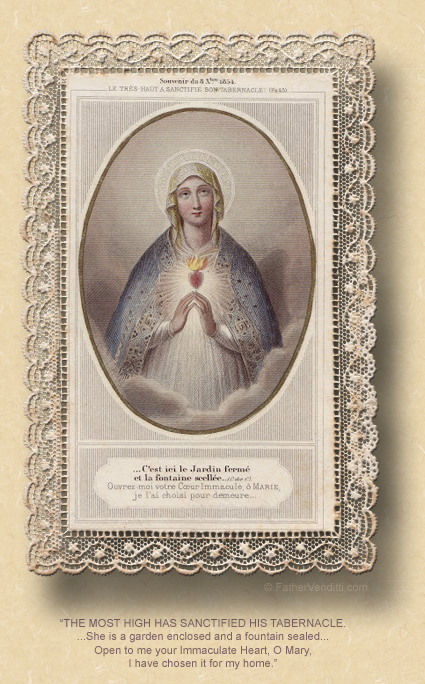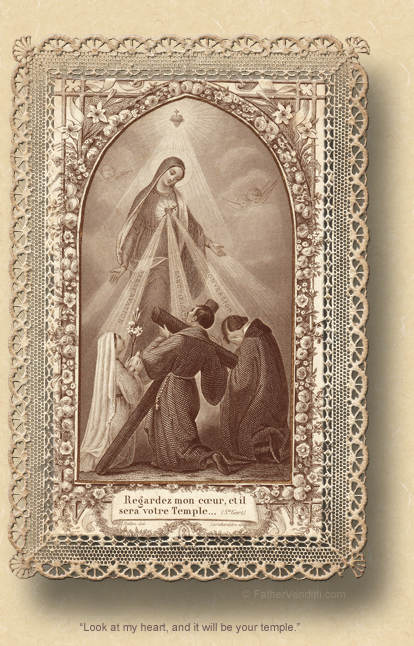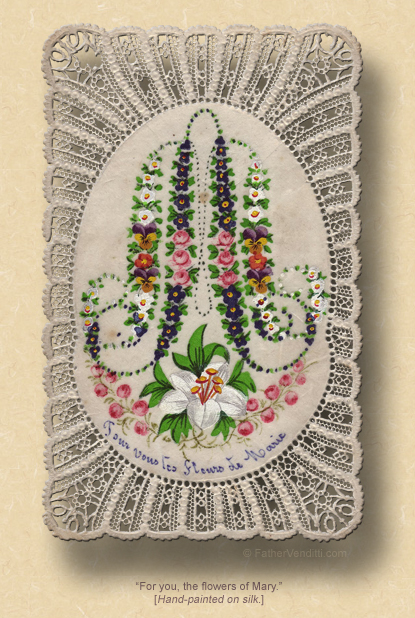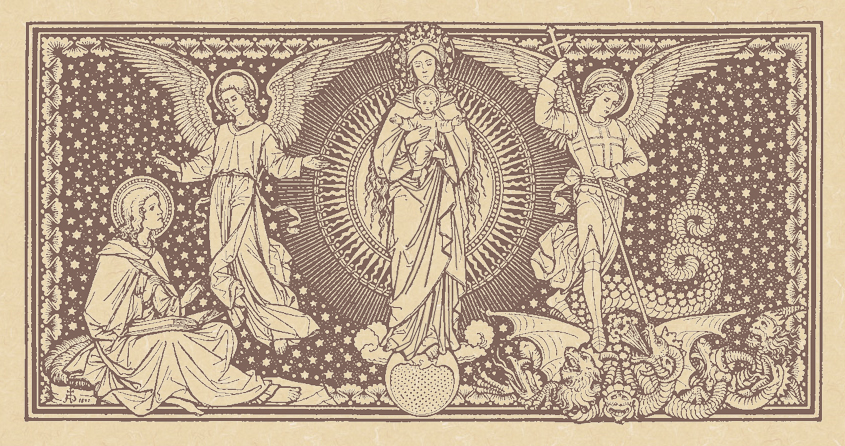The Mercy We Wish for Others Is the Measure of the Mercy We Shall Receive.
The Seventeenth Saturday of Ordinary Time; or, the Memorial of the Dedication of the Basilica of Saint Mary Major.
Lessons from the primary feria, according to the ordinary form of the Roman Rite:
• Leviticus 25: 1, 8-7.
• Psalm 67: 2-3, 5, 7-8.
• Matthew 14: 1-12.
|
…or, from the proper:
• Revelation 21: 1-5.
• [Responsorial] Judith 13: 18-19.
• Luke 11: 27-28.
…or, any lessons from the common of the Blessed Virgin Mary.
|
The Third Class Feast of the Dedication of the Church of Saint Mary of the Snows.
Lessons from the proper, according to the extraordinary form of the Roman Rite:
• Ecclesiasticus 24: 14-16.
• [Gradual] Benedicta et Venerábilis es…*
• Luke 11: 27-28.
The Eighth Saturday after Pentecost; a Prefestive Day of the Transfiguration; and, the Feast of the Holy Martyr Eusignius.**
Lessons from the pentecostarion, according to the Ruthenian recension of the Byzantine Rite:
• Romans 14: 6-9.
• Matthew 15: 32-39.
FatherVenditti.com
|
 8:16 AM 8/5/2017 — Ordinarily, on the First Saturday of every month, we offer a Votive Mass of the Immaculate Heart of Mary when permitted; but, inasmuch as the memorial offered to us optionally today is a feast of the Mother of God, I thought we would stick with the memorial of the Dedication of the Basilica of Saint Mary Major. 8:16 AM 8/5/2017 — Ordinarily, on the First Saturday of every month, we offer a Votive Mass of the Immaculate Heart of Mary when permitted; but, inasmuch as the memorial offered to us optionally today is a feast of the Mother of God, I thought we would stick with the memorial of the Dedication of the Basilica of Saint Mary Major.
Originally called the Church of Saint Mary of the Snows, the story of how this church came to be is quite interesting, and is recounted in detail in the third lesson of Matins for this day in the extraordinary form:
When Liberius was Pope, a Roman Patrician named John, and his wife, also of noble birth, having no children to inherit their goods, vowed their inheritance to the most holy Virgin Mother of God. The blessed Virgin heard their prayers and approved their vow by a miracle. On the 5th of August, which is always the season of the greatest heat in the City, snow fell by night and covered part of the Esquiline hill. And on that same night, the Mother of God told John and his wife separately in dreams that they should build a church on that place. When John told this to Pope Liberius, he said that he had had the same dream. The Pope therefore went to the snow-covered hill and there marked out a site. The church was built with the money given by John and his wife, and was later restored by Sixtus III. It has been given various names; but, so that its title may indicate its excellence, it is called the church of St. Mary Major.
And, if you ever have the privilege of assisting at Holy Mass in this basilica in Rome on this day, they have the lovely custom of remembering the miraculous August snow fall by dropping flower petals from the ceiling onto the congregation during the singing of the Gloria. It’s the oldest church in the West dedicated to the Blessed Virgin; and, if you’re ever in Rome, it’s a place to visit. In the confessio under the high altar are preserved fragments of the crib in which the child Jesus was lain in the manger. Our present Holy Father, Pope Francis, has the custom of visiting that church to pray before leaving Rome on one of his apostolic journeys. But, turning now to today’s Scripture lessons and the subject at hand…
Last year on this seventeenth Saturday of Ordinary Time, the Gospel lesson of the Baptist’s martyrdom was paired with a lesson from the Prophesy of Jeremiah; this year it isn’t, but you’ll forgive me, I’m sure, if I refer to that lesson again, as it’s integral to the point I wish to make for you today.
“It was the Lord who sent me to prophesy against this house and city all that you have heard. Now, therefore, reform your ways and your deeds; listen to the voice of the Lord your God, so that the Lord will repent of the evil with which he threatens you” (Jer. 26: 12-13 RM3).
That’s what Jeremiah said when he was threatened with a death sentence for telling the truth. Thankfully, for the Prophet, his words stabbed at the heart of the priests, prophets and princes who heard him: they spared his life. John the Baptist, in our Gospel lesson, didn't fair so well: his words stabbed to the heart as well, but Herod reacted in fear and anger, not in repentance, and had John's head cut off. Jeremiah and John: two peas in a pod, both sent by God to call His people back to the truth, both doing it in exactly the same way, and both getting very different results.  Of course, we know why God, in His Providence, allowed John to die, as it was part of the whole plan of salvation that God devised for us in Christ; Jeremiah's prophesy was only a prelude. But it does teach us some valuable lessons about the whole principle of reparation, which is so much of what we are about here at the Shrine, particularly as it pertains to our devotion of the Five First Saturdays. Of course, we know why God, in His Providence, allowed John to die, as it was part of the whole plan of salvation that God devised for us in Christ; Jeremiah's prophesy was only a prelude. But it does teach us some valuable lessons about the whole principle of reparation, which is so much of what we are about here at the Shrine, particularly as it pertains to our devotion of the Five First Saturdays.
At the risk of telling you what you already know, the requirements for the Five First Saturdays are simplicity itself: Confession, Holy Communion, five decades of the Holy Rosary and fifteen minutes of meditation on the Mysteries thereof. What may not be so simple is the requirement that these very simple things be done in a spirit of reparation. On the surface, we could interpret that command of the Mother of God in a very matter-of-fact manner, and just say that we simply make an intention to offer up these four tasks for the offenses listed by Our Lady: (1) attacks upon Mary's Immaculate Conception; (2) attacks against her Perpetual Virginity; (3) attacks upon her Divine Maternity and the refusal to accept her as the Mother of all mankind; (4) for those who try to publicly implant in children's hearts indifference, contempt and even hatred for their Immaculate Mother; and (5) for those who insult her directly in her sacred images. Today was to focus on the third of these: attacks on Our Lady’s Divine Maternity;—and I actually addressed this to an extent in our first First Saturday back in May—but, given the example to us in Holy Mass today by the two great prophets, Jeremiah and John, we need to tackle this Spirit of Reparation itself, because it can be misinterpreted; and, it is most frequently misinterpreted by those who allow themselves to do it in a spirit of contentious anger. Let me try to explain what I mean.
One of the virtues—if you want to call it that—presented to us by Our Lord in the Holy Gospels and by Our Lady at Fatima is a hatred for sin and evil; but, we are hampered by the fact that English is not nearly as expressive a language as Greek and Hebrew; and, for us, hatred is a loaded word. The word for hate in Greek is μισήσει, which literally means to reject on an intellectual level; in other words, when I express μισήσει for your argument, I'm simply saying that I have heard what you have to say, and have concluded that it's wrong, and therefore reject it. There is no connotation of an emotional response in the word; but, when we translate the Gospels from Greek into English, we need to find an English word that means the same thing—or something close to it—so, we choose the word “hate,” which is an emotionally charged word. Even if we were to try and tone it down by choosing the word “rejection,” that, too, implies an emotional response for us.  And I have often feared that many devotees of Fatima, when entering into their First Saturday duties, practice what they believe is a spirit of reparation with a kind of curmudgeonly attitude, as if they're saying, “Lord, single out those who have committed these five offenses against Your Mother, and make sure they get their comeuppance.” That does not even resemble a true spirit of reparation. And I have often feared that many devotees of Fatima, when entering into their First Saturday duties, practice what they believe is a spirit of reparation with a kind of curmudgeonly attitude, as if they're saying, “Lord, single out those who have committed these five offenses against Your Mother, and make sure they get their comeuppance.” That does not even resemble a true spirit of reparation.
Now, the interior life is like every other aspect of life in one respect, in that we bring to it all the emotional baggage that results from how we've been raised and what we've had to endure in our lives; and, I've known—and I'm sure you've known as well—people who are just naturally bitter and angry people. Their patron saint is the Prophet Jonah. If you've never read the Book of the Prophet Jonah, it's very short, and right at the very beginning Jonah is presented to us as a very bitter and angry man without any explanation why. He just is that way, and everything that happens to him is because of his penchant to always assume the worst about everyone; and, when he finally agrees to go and preach to the city of Nineveh, he secretly harbors a desire that they don't repent, because he wants to see them destroyed. They do repent, and the last scene in the book is Jonah sitting under a tree hating God because God didn't destroy them. God reaches out to Jonah and wants to talk to him about it, but Jonah refuses to listen, and that's how the book ends. And we never do find out why Jonah is that way.
We've all known people like this: they're angry at the world, and take out their anger on everyone they meet, and we will probably never know why. And when such people take up the First Saturday devotion, their idea of a spirit of reparation is to beg Our Lord to punish those who have offended Our Lady. But that's not reparation.
It's the Prophet Jeremiah who gives us the first Scriptural explanation of a true spirit of reparation: “…reform your ways and your deeds; listen to the voice of the Lord your God, so that the Lord will repent of the evil with which he threatens you” (26: 13 RM3). Reparation has to be in conjunction with the virtue of charity. We make reparation not because we hate the sinner, but because we love the sinner and we want the sinner to be spared. Ideally, we want the sinner to repent; but, even if he doesn't repent, we still want him to be spared. Why? Because there isn't one of us who is not a sinner, and the mercy we wish for others is the measure of the mercy we shall receive ourselves.
During this Mass let us pray for reparation, but making sure that it's true reparation we seek, asking Our Lord to visit his mercy on all sinners, so that they may be saved.

* The Gradual is non-Scriptural: "O Virgin Mary, blessed and venerable art Thou: Who without blemish to Thy maidenhood, didst become the Mother of the Saviour. O Virgin Mother of God, He whom the whole world cannot contain, enclosed Himself within Thy womb, and became man."
** Eusignius, a general in the Roman Legion, was martyred in Antioch, the city of his birth, in the year 362 under the reign of Julian the Apostate.
|

